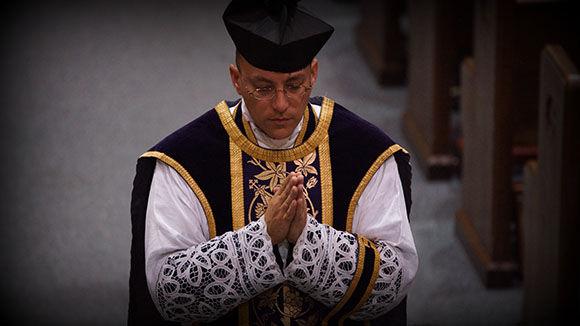Catholic World Report Interviews Fr. Gregory Pendergraft, FSSP
Fr. Gregory Pendergraft, FSSP, Director of Development for the North American District, recently spoke with Mr. Peter Graves of The Catholic World Report to talk about the Traditional Latin Mass and the booming vocations “problem” of the Fraternity. Some excerpts:
CWR: Most Catholics today are not old enough to remember the Church before Vatican II. How are you received by parishioners and priests unfamiliar with the Fraternity or the Church before Vatican II?
Father Pendergraft: Knowledge must precede love. This is no different with the liturgy than it is with anything else. For this reason we try to encourage the faithful to experience the Traditional Mass so that they can see the many graces it has to offer. Interestingly, it is the younger generation among both priests and parishioners who are often most actively seeking the ancient rites of the Church.
As far as a reaction, most often it is the liturgy that speaks for itself. When Catholics have the opportunity to experience this liturgy they are very often intrigued and interested and want to know more about it. Thus, our role is often more that of teaching rather than trying to garner interest. As we are easily identified by the wearing of the Roman cassock, we are received with every emotion possible based on the likes or dislikes of the individual with whom we have contact. Yet, the many friendships we have with the bishops and priests who have visited our parishes and seminaries and the faithful who discover one of our parishes attest to the power of charity and the desire for sanctity to overcome any obstacle.
CWR: What do you think the Extraordinary Form liturgy brings to parishes and dioceses?
Father Pendergraft: The Extraordinary Form liturgy sanctified generations of faithful Catholics in the past and continues its work in the present. The singular beauty and reverence of the Mass and its link to the traditional practices of the Catholic faith help to free us from the bonds of sin and the attachment to the things of the world. A strong emphasis on the need for repentance often inspires a return to the sacrament of confession, which has been called the “forgotten sacrament” in our modern age.
The entire article can be read here.
July 3, 2015









